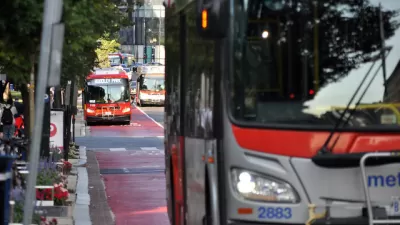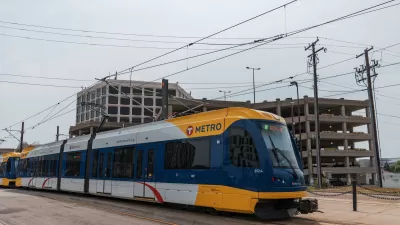Angie Schmitt takes issue with the controversial premise of a recent story from the popular Freakonomics guys. True to their reputation for counter-intuition, their most recent report makes the claim that "driving is greener than transit."

In a recent, attention-grabbing story for Marketplace, Stephen Dubner of Freakonomics fame explores what Schmitt contends is an "intellectually dishonest argument" about the relative environmental friendliness of driving a car versus taking public transit. Clemson University’s Eric Morris, a regular contributor to the program, walks Dubner through the argument for the benefits of the car based on per-passenger energy consumption.
As Schmitt explains, "Buses are potentially much more efficient than cars, Morris admits. But many buses are underutilized: The average bus carries just 10 passengers, while the average car carries 1.6. As a result, Morris says, those traveling by bus consume 20 percent more energy per passenger than people driving in cars."
While Schmitt seems to agree with Morris's assertion that "if we can persuade more people to leave cars and move onto the existing transit system that we already have, that's a complete win for the environment," she takes issue with his simplistic argument against building new transit in places like Cleveland, Pittsburgh and Memphis.
"Clearly, many American cities need to repair decades’ worth of damage to the walkable urban fabric that makes transit efficient and well-used," says Schmitt. "They also need to build better transit so new walkable development can flourish."
"Dubner notes at the beginning that New Yorkers have the smallest per-capita carbon footprint in the United States, but he never fully explains why places with good transit like New York, Boston, and San Francisco also have some of the lowest energy consumption rates in the country. There’s no reason places like Cleveland, Pittsburgh, and Memphis can’t join them as green cities with great transit."
FULL STORY: Freakonomics Hucksters: “Save the Earth, Drive Your Car”

Alabama: Trump Terminates Settlements for Black Communities Harmed By Raw Sewage
Trump deemed the landmark civil rights agreement “illegal DEI and environmental justice policy.”

Study: Maui’s Plan to Convert Vacation Rentals to Long-Term Housing Could Cause Nearly $1 Billion Economic Loss
The plan would reduce visitor accommodation by 25% resulting in 1,900 jobs lost.

Planetizen Federal Action Tracker
A weekly monitor of how Trump’s orders and actions are impacting planners and planning in America.

Wind Energy on the Rise Despite Federal Policy Reversal
The Trump administration is revoking federal support for renewable energy, but demand for new projects continues unabated.

Passengers Flock to Caltrain After Electrification
The new electric trains are running faster and more reliably, leading to strong ridership growth on the Bay Area rail system.

Texas Churches Rally Behind ‘Yes in God’s Back Yard’ Legislation
Religious leaders want the state to reduce zoning regulations to streamline leasing church-owned land to housing developers.
Urban Design for Planners 1: Software Tools
This six-course series explores essential urban design concepts using open source software and equips planners with the tools they need to participate fully in the urban design process.
Planning for Universal Design
Learn the tools for implementing Universal Design in planning regulations.
Caltrans
Smith Gee Studio
Institute for Housing and Urban Development Studies (IHS)
City of Grandview
Harvard GSD Executive Education
Toledo-Lucas County Plan Commissions
Salt Lake City
NYU Wagner Graduate School of Public Service




























